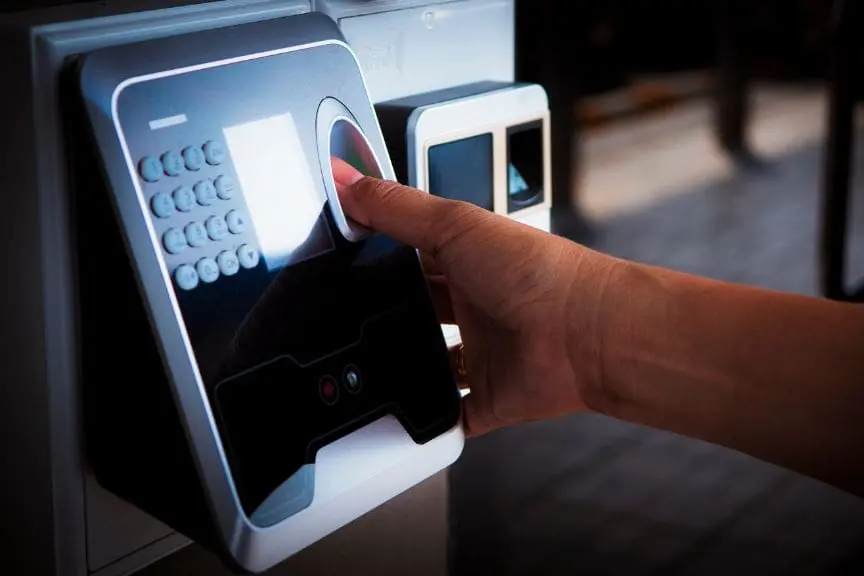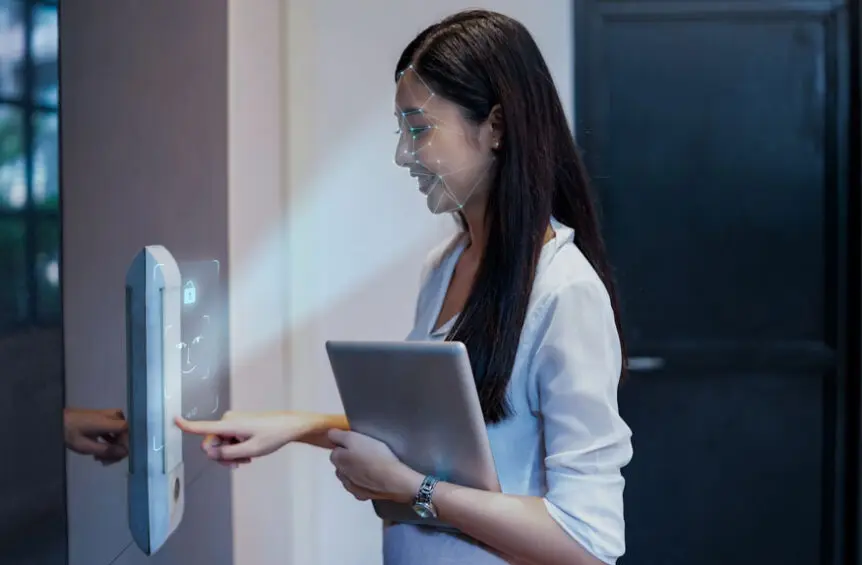TABLE OF CONTENTS
Facial Recognition Technology Topics This Blog Includes:
- How is Facial Recognition Technology used in Commercial Security?
- What are the Benefits and Challenges of using Facial Recognition for Business Security?
- What Regulations Govern the use of Facial Recognition Technology in Commercial Security?
- The Rise of Facial Recognition in Business Security
- Key Benefits of Facial Recognition Technology
- Potential Challenges and Considerations
- Future Trends in Facial Recognition for Commercial Security
How is Facial Recognition Technology used in Commercial Security?
Facial recognition technology is widely used in commercial security for access control, surveillance, and identity verification. Businesses employ facial recognition to allow entry only to authorized individuals, enhancing both security and operational efficiency.
Beyond access control, facial recognition enables real-time monitoring and alerts, helping security teams identify potential threats. Many companies integrate facial recognition into existing security systems, using it to replace or supplement keycard access and streamline employee management. In high-security sectors, such as finance and healthcare, facial recognition also plays a role in data protection by limiting access to sensitive areas, thus reducing the risk of data breaches.
What are the Benefits and Challenges of using Facial Recognition for Business Security?
Facial recognition offers numerous benefits for commercial security, including enhanced accuracy, speed, and convenience. Unlike keycards or passwords, which can be lost or stolen, facial recognition provides a unique, biometric-based identification method that reduces the risk of unauthorized access.
However, businesses face challenges in adopting this technology. Privacy concerns are significant, as employees and customers may be uncomfortable with biometric data collection. Additionally, facial recognition can be expensive to implement and maintain, and it may require integration with other systems to be fully effective. Lastly, accuracy can vary depending on factors like lighting and camera quality, which businesses must consider to ensure reliable results.
What Regulations Govern the use of Facial Recognition Technology in Commercial Security?
Several regulations govern the use of facial recognition technology in commercial settings, and they vary by region. In the United States, the Biometric Information Privacy Act (BIPA) in Illinois and the California Consumer Privacy Act (CCPA) provide specific guidelines on biometric data collection and usage, requiring businesses to obtain consent and protect collected data.
Globally, the General Data Protection Regulation (GDPR) in the European Union sets strict standards on biometric data, classifying it as sensitive information. This regulation mandates transparency, consent, and data security measures for businesses using facial recognition. Businesses adopting this technology should stay informed on federal, state, and local regulations to ensure compliance and avoid potential legal issues.
Want to Learn More About Biometric Access Control Systems?

The Rise of Facial Recognition in Business Security
With advancements in artificial intelligence (AI) and machine learning, facial recognition technology has become more accurate and accessible, making it a powerful tool for commercial security. Today’s systems can quickly identify individuals based on facial features, creating a more secure and efficient environment for businesses.
Companies are increasingly adopting facial recognition for its versatility. Beyond security, facial recognition can be used for time-tracking, customer analytics, and even personalized marketing. As these applications expand, this technology continues to evolve, addressing the security needs of modern businesses in diverse ways.
Key Benefits of Facial Recognition Technology
One of the primary benefits of facial recognition technology is its ability to provide fast, contactless access control. Employees and authorized visitors can enter secure areas without physical keys or badges, streamlining entry processes and reducing the risk of lost or stolen credentials. This contactless approach has become especially relevant in the wake of health and safety concerns, such as those presented by the COVID-19 pandemic.
Another advantage is the integration of facial recognition into larger security systems. Combining facial recognition with video surveillance, alarm systems, and monitoring platforms allows businesses to create a comprehensive security solution. When used in tandem with other tools, facial recognition provides real-time insights, helping security teams respond to incidents more effectively.
Potential Challenges and Considerations
Despite its benefits, facial recognition technology raises concerns, particularly around data privacy and security. Biometric data is highly sensitive, and if mishandled, it can lead to identity theft or other security risks. Companies must invest in robust data encryption and access management to safeguard this information.
Another challenge is accuracy, especially in diverse environments where lighting, camera angle, or environmental conditions may vary. Facial recognition systems need to be consistently updated and monitored to maintain their accuracy, which can add to operational costs. Finally, companies must navigate the ethical implications, ensuring they respect individual privacy while implementing facial recognition.
Future Trends in Facial Recognition for Commercial Security
As facial recognition technology advances, it is likely to become more precise and adaptable, with improvements in AI enabling systems to recognize individuals even in low-light or crowded environments. Emerging technologies, such as 3D facial recognition, offer even greater accuracy by analyzing depth in facial features, making the technology more effective.
Another trend is the increased focus on privacy and ethical usage. Many companies are proactively implementing policies to limit data retention, encrypt facial data, and provide transparency on data usage. As society and legislation continue to address privacy concerns, businesses using facial recognition will need to adapt to ensure ethical compliance.
Secure Your Business with Advanced Access Control
As commercial security evolves, The Flying Locksmiths and FlyLock Security Solutions are here to help your business stay protected with the latest in facial recognition and access control technology. Our team of experts is ready to design and implement security solutions tailored to meet the unique needs of your business, from streamlined access management to enhanced monitoring.
Ready to elevate your business’s security? Contact us today to learn more about our comprehensive access control systems, including state-of-the-art facial recognition and video surveillance. Whether you’re updating an existing system or installing new security infrastructure, we’ll provide the expertise, products, and support you need to safeguard your property and assets.
Call us or fill out our online contact form to schedule a consultation. Let The Flying Locksmiths and FlyLock Security Solutions be your trusted partner in commercial security—protecting your business, empowering your team, and giving you peace of mind.


